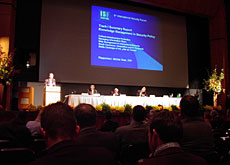
Questions of insecurity

The international “war on terrorism” has been the subject of expert discussions in Zurich this week.
Professionals from more than 50 countries have been debating current problems and possible solutions at the fifth International Security Forum (ISF).
The Forum, which takes place every two years, is staged alternately in Zurich and Geneva. This year’s event could hardly have been more timely, starting just two days after the terrorist bomb attacks in Bali.
“The delegates here are all professionals in the field of security,” noted Forum chairman Kurt Spillmann, “so they didn’t need to be reminded about the global interconnection of terrorism, but the events in Bali will certainly have reminded the general public that terrorism can strike anytime and anywhere.
“The attacks in Bali did not change the course of our discussions here, but the talks went on with everybody fully aware of the ubiquity of terrorism.”
Spillmann, a professor at Zurich’s Centre for Security Studies and Conflict Research, said it would be impossible to fully sum up the findings from the ISF’s 30 workshops in a few sentences, but did outline some of the common threads.
Three ‘c’s
“I think we can talk about the three ‘c’s,” he told delegates at the closing session. “First there is the growing complexity of international security, then there is the comprehensiveness involved, with security no longer covering just military and political questions – but also issues of gender, economics and the ecology.
“Finally, there is the emphasis on co-operation, without which international security cannot succeed.”
Given the increasingly unconventional nature of terrorism, many delegates warned against the inadequacy of conventional responses.
War in Iraq?
None of the final day’s speakers expressed any certainty over the chances of a war in Iraq with estimates of the likelihood ranging only from “50 per cent avoidable” to “more likely than not”. However there was general agreement on the problems that such a war would create.
Jean Freymond of the Geneva-based Centre for Applied Studies in International Negotiations pointed to the ongoing difficulties in Kosovo, citing the Balkan province as an example of what could lie ahead in a post-war Iraq.
Setting out the conclusions of the workshop on rehabilitating war-torn societies, Freymond argued that “the rehabilitation of Iraq would be such a formidable task that all should be done to avoid war.”
UN special envoy Carl Bildt concurred, borrowing heavily from the phrase-book of Saddam Hussein to assure the Forum that Iraq’s international rehabilitation would require “the mother of all nation-building efforts.”
Solutions
As far as positive solutions were concerned, Dr Shahram Chubin of the Geneva Centre for Security Policy stressed the need to tackle the root causes of Islamic extremism.
“Extremism grows from the real problems faced by those living in repressive regimes and by the problems of identity which globalisation presents to the Islamic world,” argued Chubin. “This clash with the modern world has helped the extremists to sideline moderate thinkers, so we should consider the main battle to be within Islam rather than being a direct clash between Islam and the West.”
Chubin added that the spread of extremism among western-based Islamists had been accelerated by the integration problems faced by immigrants.
“But these integration problems are mainly economic and not particularly different from those felt by other minority groups,” Chubin insisted. “That is why it is important not to demonise Islam, or to categorise it as an enemy, and why we must also speed up integration.”
Worldwide distribution
The detailed findings and opinions of the ISF will be collected into a single volume for worldwide distribution in spring 2003, by which time the threat of war in Iraq may have turned into historical reality.
Professor Spillmann is unhappily confident, however, that the general problems considered at this year’s Forum will still be relevant and that his colleagues will still have plenty to talk about at the 2004 meeting in Geneva.
“Most of us here are aware that we cannot look back to the old world situation and hope to revive a similarly stable state in the future. Security issues will continue to change their aspect and shift from region to region.
“The sense of security that we developed in the old bipolar world has gone for good, which means a lot more insecurity for the world in general and much more work for the world’s governments and their security experts.”
swissinfo, Mark Ledsom in Zurich.
The ISF was initiated in 1994 by the Swiss defence and foreign ministries “to increase communication and cooperation among institutions engaged in research related to international security in the Euro-Atlantic area.” This year’s Forum brought together 156 speakers from more than 50 countries.

In compliance with the JTI standards
More: SWI swissinfo.ch certified by the Journalism Trust Initiative

























You can find an overview of ongoing debates with our journalists here . Please join us!
If you want to start a conversation about a topic raised in this article or want to report factual errors, email us at english@swissinfo.ch.